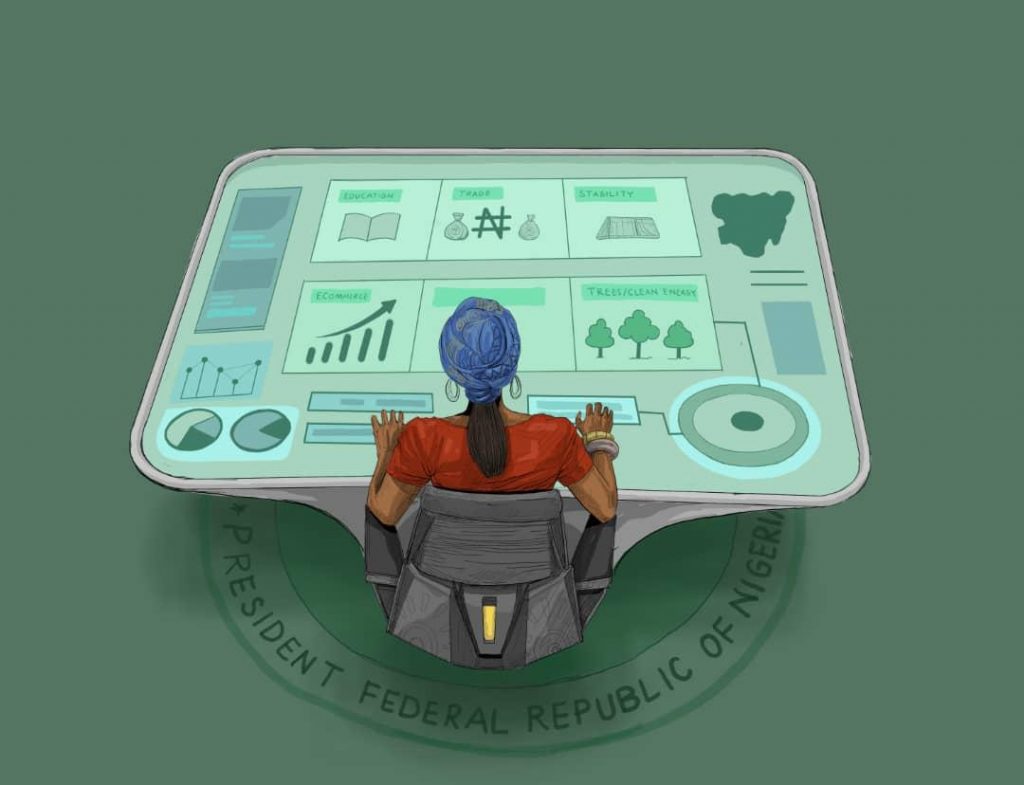Towards Vision 2050
We can achieve more when we work united towards shared goals, irrespective of our identities. Unity in diversity is power.
A Nigeria where anyone from any background can succeed without barriers.
It all started in 2020 after the nation celebrated its 60th independence day. The youths decided they were tired of the nation’s brutal state.
A snapshot of the nation shows that the education, security and economic sectors weren’t doing well. Universities were closed nationwide, workers’ salaries were owed, infrastructure was in a diplorable state, the transport network was in its worst state, yet the youths strived to have their heads above the troubling waters.
The camel’s back finally broke when government law enforcement won’t stop killing the youths and their future. The police agency, established to protect the law-abiding citizens, increasingly killed, kidnapped, extorted, and framed them for crimes.
‘Enough is enough’ That became the major song on the lips of the youths! A nationwide protest known as the #EndSars erupted. It was the first of its kind and the tiny candlelight in the thick darkness that had clouded the nation.
That nationwide protest would have been impossible without the existence of social media, smartphones and the internet. These were the handshaking powerhouses that helped people to connect, record and openly share their experiences. The protest lasted a few days but it created a deeper realization. This problem was wider and far-reaching across all social groups, and only a common and united voice will make the change happen. Before then, the nation was in great divide and the centre couldn’t hold. People had split and had dotted lines of tribe, religion, social class and gender brightly coloured with disunity.
“Each to its own tribe” was the order of the day. Each group thought the problems they faced were local to their group and they had no business poking their nose into whatever other groups faced. Well, who would wear the blame on them? The tribes were brought together to form a nation by their colonizers, and there has been a power tussle between them ever since.
The disconnect grew, the tension became hotter and mistrust climbed over the roof after a civil war in the late 1960s that led to the death of many. The government tried to mend the torn pieces and promote unity by establishing a National Youth Service Corp (the NYSC), where young graduates are deployed to other parts of the nation to serve the country while learning about other people’s cultures. This was expected to bridge the tribal and cultural gaps. Interestingly, in 2020, a set of technologies created a new form of connection that helped reshape people’s views. The protest zoomed in on the fact that decentralized and diverse governance is achievable, and it enables more transparency, accountability and effectiveness. It was evident that women, who were usually seen as incompetent to handle political power, became the power source and backbone of the protest. Welcome to a new dawn in Nigeria! Nigerians embraced a new song, ‘unity in diversity is power’.

After the protest, policies to enable healthy digital co-existence were introduced, and political apathy crumbled flat on its face. People became aware and open to electing the candidate with the best interest of the nation at heart irrespective of their tribe, gender, or religion.
The legs, heart and hands of blockchain began to surface, and its growth in the country became like a good aroma off the kitchen of the best cook.
The 2027 election wasn’t business as usual and vrooooooom, people were installed into power. The election blew a new wind that caused a huge power shift – the new government had a real-time open-door policy; it was diverse, inclusive, progressive, transparent, and accountable.
What a dream! No, this was reality, right in our faces. We touched it, felt it, tasted it and wished we could eat it. This new approach to governance has been maintained till now, as you can see. Respect for other people’s views is the new unwritten constitution. Enchanting and non-discriminatory social groups emerged. The education curriculum was revamped to teach the new social norm and values while educating students on the nation’s history.
The curriculum encouraged innovation, contribution, dialogue that resulted in an unending catalyst – a seamless development of the nation in all sectors that the public became proud of. For instance, blockchain technologies were developed to answer the call for transparency, accountability and decentralization of the nation’s governance.
The government became more participatory and collective than ever. Structures were put in place to involve the citizens in key decision-making processes. You wished that was all? No, not too soon. A shift swept through the corridors, windows and doors of the tech industry. Technologies were designed with, by and for the people that needed them. They have exciting synchronization of sustainability, decentralization, accessibility, transparency while preserving our cultural history and heritage. This is the reflection of the new Nigeria and our shared values.

You see, as our elders say: “all fingers are not equal. However, every finger has its unique function.” We can achieve more when we work united towards shared goals, irrespective of our identities.
In essence, unity in diversity is power.
Download story as PDF